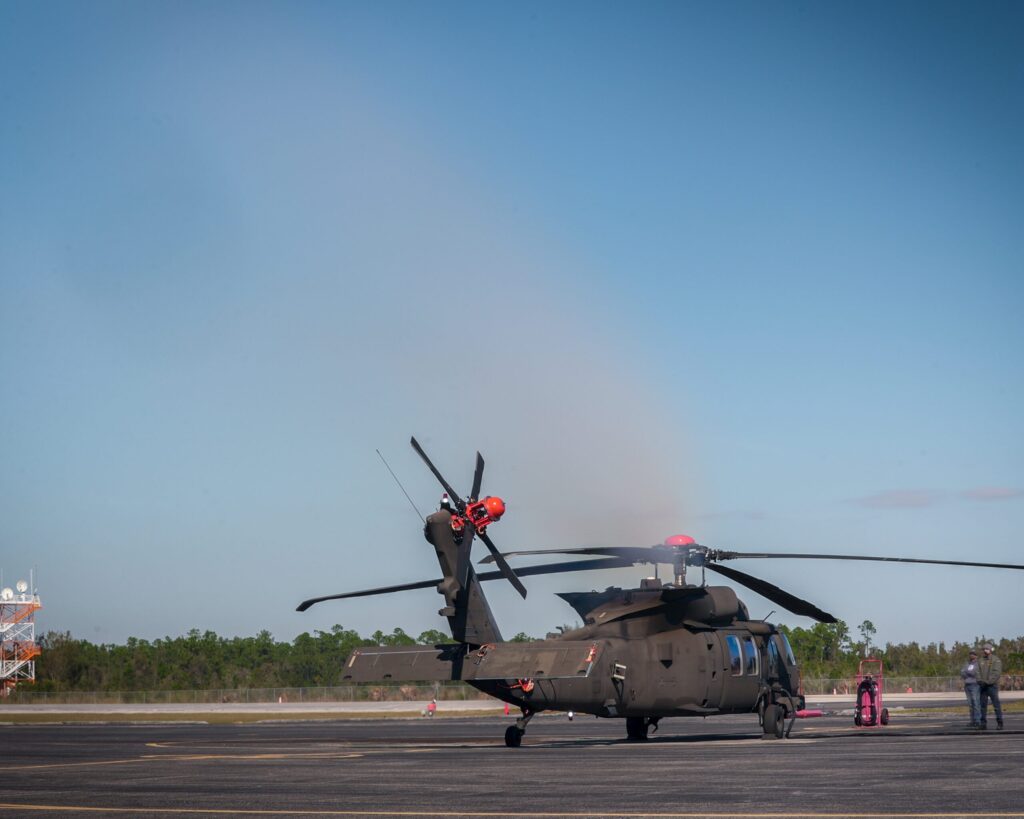
Sikorsky started ground runs on a UH-60M Black Hawk equipped with two Improved Turbine Engines (ITE) in West Palm Beach, Florida. Photos courtesy Sikorsky, a Lockheed Martin company
Sikorsky has said it’s working on negotiations for the next multi-year Black Hawk contract, eyeing an award from the Army around December 2026, while also continuing to test the helicopter with the new GE Aerospace T901 engine.
Jay Macklin, director of strategy and business development for Sikorsky’s Army and Air Force systems, told reporters recently the targeted date for the Multi-Year XI contract would ensure the next deal picks up as the current production contract is set to end.
“We’re certainly committed to making this the most affordable Black Hawk that we can make it,” Macklin said in a recent briefing. “We believe the multi-year is the best way to deliver that affordability.”
Macklin noted Sikorsky turned in its proposal for the Multi-Year XI contract at the end of February, and that the deal would cover a period of performance from 2027 to 2032 with a base of 100 Black Hawks and a max of up to 255 aircraft.
The Army and Sikorsky in June 2022 signed the latest multi-year UH-60M Black Hawk contract, awarding the company a five-year deal worth $2.3 billion for delivery of 120 H-60M helicopters.
With options, the Army noted the 10th multi-year deal for Black Hawks could potentially be worth $4.4 billion and cover more than 250 helicopters, to include aircraft for Foreign Military Sales customers.
When the Army announced its major aviation restructure in February 2024, which included canceling development of the Future Attack Reconnaissance Aircraft, it detailed plans to award another multi-year contract for UH-60M Black Hawks with the newly freed-up resources and to prioritize modernization upgrades as it looks to continue flying the platform for decades.
At a House Appropriations Defense Subcommittee hearing in May, both Army Secretary Dan Driscoll and Gen. Randy George, the service’s chief of staff, declined to offer a firm commitment on awarding another multi-year deal for more Black Hawks, and said they would have to get back to the committee with an answer on that decision.
Rich Benton, Sikorsky’s vice president and general manager, told reporters the company is “actively working” on Multi-Year XI with the Army and anticipates progress “very shortly” to begin moving out on long lead items for the expected award.
“[That] Multi-Year XI contract will leverage the foundation of the [modernization] things we’ve done here, but also put us into the future. And the Army has said, right, [they’re] going to fly Black Hawks until the 2070s. And the Black Hawk we fly in 2070 won’t be the Black Hawk we have today,” Benton said.
The Army in August awarded Sikorsky a $43 million deal for an array of Black Hawk modernization engineering efforts, to include airframe enhancements, building out a “digital backbone” capability and work to integrate with launched effects (Defense Daily, Aug. 20).
“We’re tightly coupled with the Army [on] what is the Black Hawk of the future going to look like,” Benton said.
Benton also confirmed Sikorsky has now been flying “for several months” with the new T901 engine, developed under the Army’s Improved Turbine Engine Program (ITEP), to include test flights up to 4,000 to 5,000 feet.
“We’ve been collecting the test data. It is doing the things it needed to do and we are going to continue to apply that. And we are currently funded to continue flying that for the next few quarters. And we continue to get test data from that standpoint,” Benton said. “I am confident that the continued success of the ITEP engine will provide the supporting data that it will make a difference in the future [for] the Black Hawk and even potentially the Apache.”
Sikorsky conducted the first hover test of a Black Hawk with the T901 engine in May.
The fate of the ITEP program has faced uncertainty after it was included as a proposed cut under the Army Transformation Initiative, while Benton noted funding was included in the previously passed reconciliation bill that has allowed testing to continue.
“That funding has been provided to us by the Army to continue the testing of the ITEP program. And we are currently working, along with GE, to shape and accelerate the test program,” Benton said. “We want to go faster. We want to deliver capability. And so, we’ve been working tightly with the Army on how can we move at a faster pace to drive affordability into that test program and to get it out to the field faster.”
“I think success [with testing] is the number one thing we can do to keep that money going forward and push that program forward,” Benton added.
A version of this story originally appeared in affiliate publication Defense Daily.